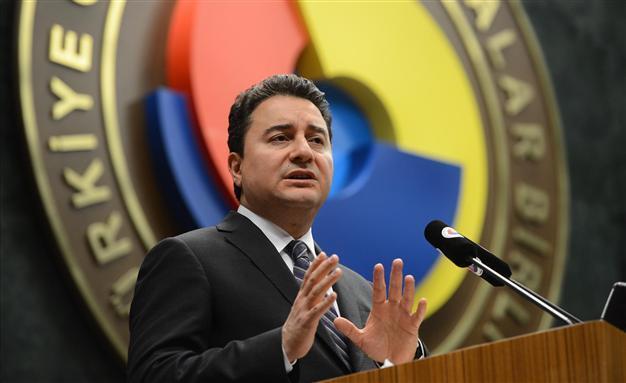Turkey should fix judiciary system to ensure trust in markets: Deputy PM Babacan
ANKARA

Deputy Prime Minister Ali Babacan stressed the law was the most important factor in the bid to create trust in countries’ economies.
Recent political developments have demonstrated that Turkey is experiencing difficulties in ensuring the rule of law, but further improvement is crucial for maintaining order in the economy, Deputy Prime Minister Ali Babacan said, signaling that Turkey should not tolerate corruption.Speaking during a meeting with Turkish private sector representatives to listen to their problems, Babacan stressed the law was the most important factor in the bid to create trust in countries’ economies.
“We want to see a country that is based on the superiority of law. We have been putting efforts into that for 11 years but we watched and saw that we have weak points during the developments of the past two to three months,” he said, addressing some of Turkey’s top business representatives at the seventh Sectorial Economy Council hosted by the Turkish Union of Chambers and Commodity Exchanges (TOBB).
“Efforts of decades can vanish within weeks or months. We should appreciate the environment of trust in our country and do whatever is needed to enhance it,” the deputy prime minister said.
To achieve full security of law, Babacan urged taking steps toward a fast, consistent and reliable judiciary system.
“This means open laws, the elimination of grey areas, not turning back, protecting rights that have been earned and not changing laws often,” he said.
This year’s council meeting that brings together the private sector and the managers of the economy is regarded as particularly important, as the mounting pressure on the economy in the country has raised the importance of a platform that offers the opportunity for the government to listen to the most important sectorial problems first-hand.
The Turkish economy has been under great pressure from the declining liquidity environment in global markets after the U.S. Federal Reserve’s decision to withdraw its asset purchase program. However, the major blow to the already suffering economy has become the political crisis in the country that broke out with the Dec. 17 corruption and bribery investigation into a number of businessmen and civil servants allied to the government.
The political and judiciary scandal rattled investors’ perception of Turkey and the adoption of controversial legislations, including a bill that boosts government control on Turkey’s judiciary body and Internet bill that has been criticized as a government attempt to curb Internet freedoms in the aftermath of the incidents further deepened the concerns.
Despite the government’s defiant attitude that has been downplaying the graft so far, Babacan also said the intensifying fight against corruption was important to win trust in markets.
“When we talk about transparency, the fight against corruption is an inseparable part of this. Any corruption shouldn’t be covered up and tolerated. This is an issue that we, as the government, attach great importance to and will continue to target in the upcoming period without any compromise,” he said.
Speaking at the same event, TOBB Chairman Rifat Hisarcıklıoğlu used the platform to warn of the risks lying ahead of the Turkish economy, calling on all actors in the economy sphere to form a united front.
He said that in the short term, the low liquidity environment that ended easy and cheap borrowing opportunities would force both companies and citizens to be more cautious.
“We, as the public management and private sector, have to focus on how to adapt to this new environment and preserve the growth-employment-welfare rise balance,” he said.
In the long term, the accelerating regionalization led by the two separate major trade pacts the United States is considering signing with the European Union and Asia-Pacific countries would change the dynamics of the global system, Hisarcıklıoğlu said.
“The importance of these two initiatives lies in this: first, an alternative rise to trade liberalization negotiations pioneered by the World Trade Organization (WTO). In other words, the way has been paved for these talks to remain unconcluded. More importantly, these two initiatives equal two-thirds of global economic power. Therefore, this gives them great power to decide not only trade and investments, but also production standards,” he sa
















